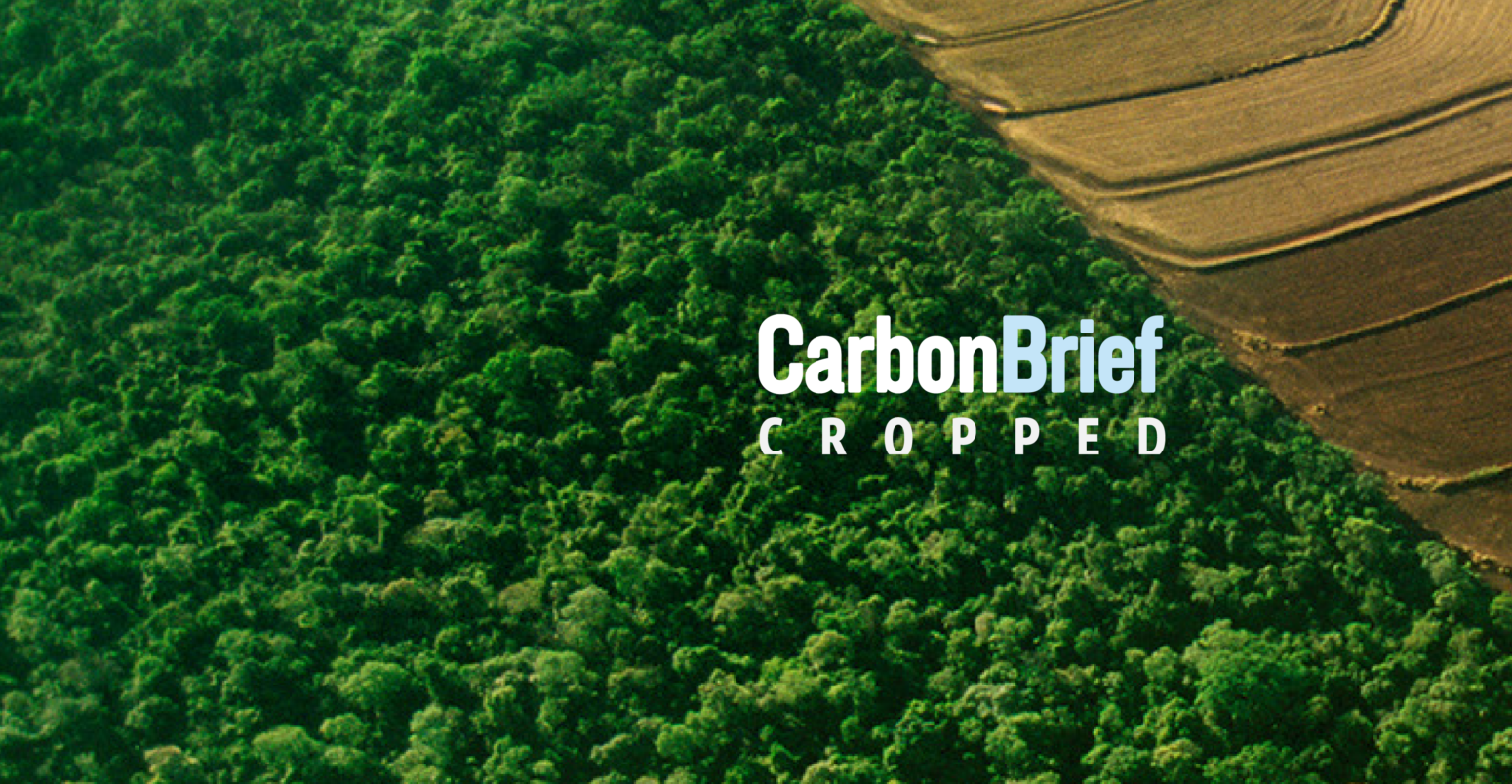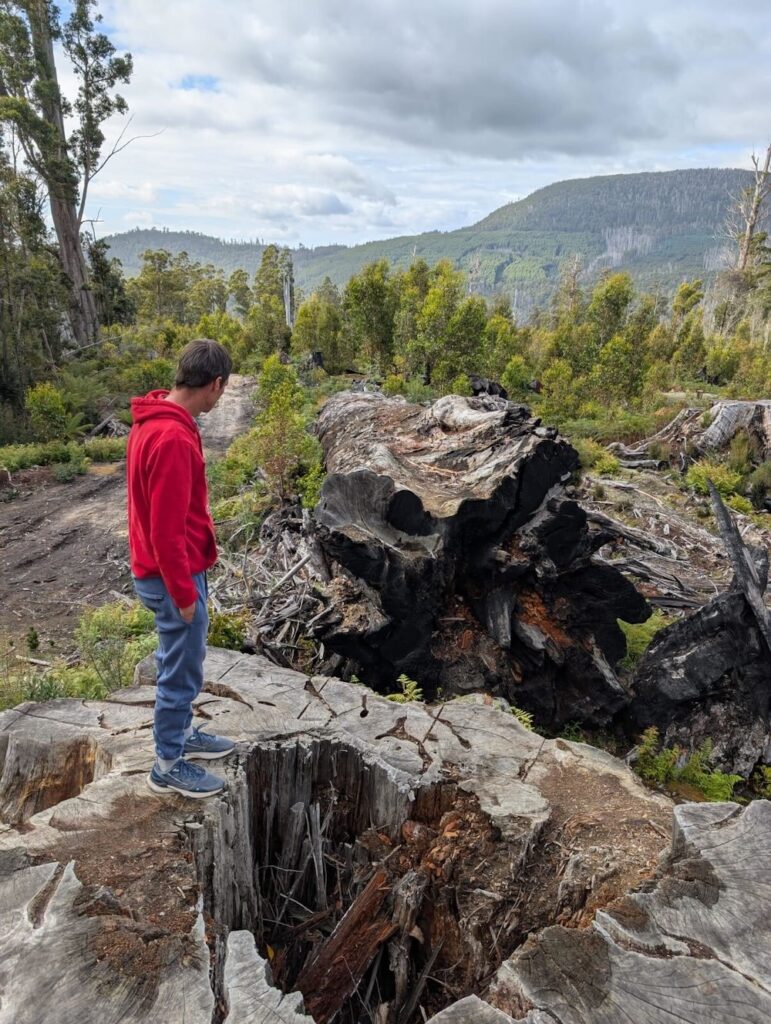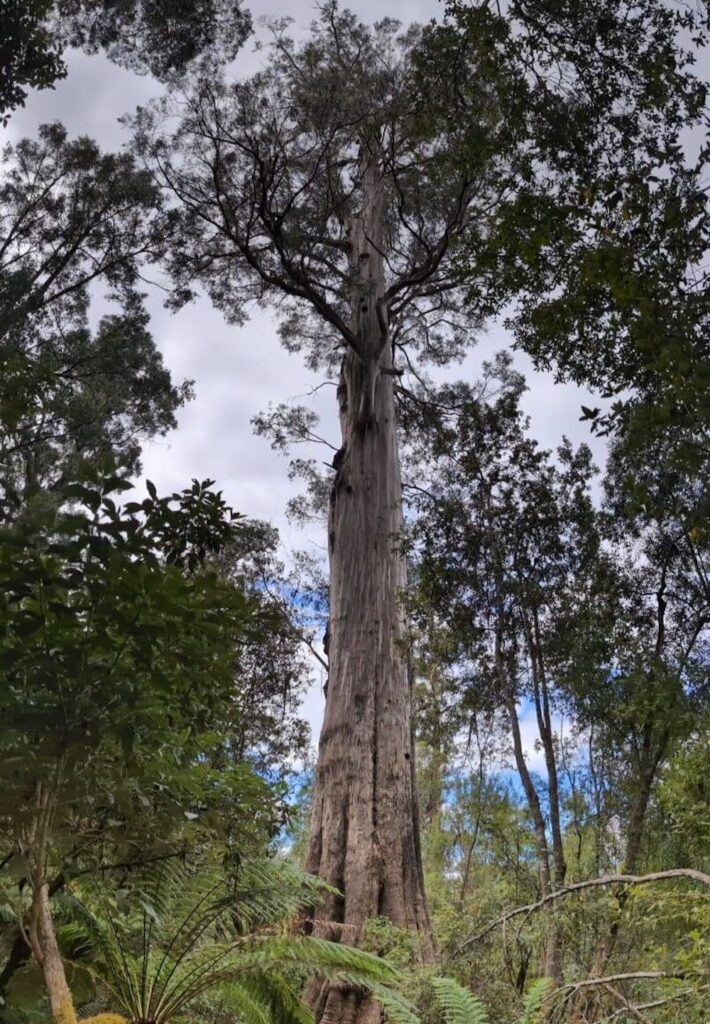
Cropped 9 April 2025: Trump’s tariffs; UK megafarm ‘blocked’; ‘Sus timber’ in Tasmania
Multiple Authors
04.09.25Multiple Authors
09.04.2025 | 3:00pmWe handpick and explain the most important stories at the intersection of climate, land, food and nature over the past fortnight.
This is an online version of Carbon Brief’s fortnightly Cropped email newsletter. Subscribe for free here.
Key developments
Trump’s tariff fallout
WASTE NOT: US president Donald Trump’s wide-ranging tariffs will “almost certainly mean higher prices at the grocery store”, Grist said, adding: “It could also, according to experts, increase food waste along the supply chain.” (Food waste makes up about half of global food-systems-related emissions.) The Center for Science in the Public Interest, a Washington DC-based thinktank, wrote that the “tariffs and trade wars threaten our food security”. It said: “We’ll all pay more to feed ourselves at a time when nutrition assistance is under threat and the spectre of recession looms overhead.”
EXPORTERS ON EDGE: Following the tariff announcement, the EU’s “spirits, wine, dairy and olive-oil sectors are bracing for a severe blow”, Euractiv reported this week. The outlet noted that the US is the bloc’s “second-largest food and agriculture export market, after the UK”. It said that the high-value products that the EU produces “are more difficult to divert to other markets” than many US exports, such as soya. Meanwhile, the Washington Post reported that US wine aficionados are “stockpiling European wines as tariffs take effect”. One shop owner told the outlet: “People know that once we have to restock, prices will go up.” A Financial Times column warned that the world is facing a “rice crisis”.
FARMER FUNDS: Agricultural groups in the US are “warn[ing] of economic fallout from the president’s tariff push” and lobbying for increased relief for farmers, the Wall Street Journal reported. The outlet noted that Congress approved $10bn in farmer funds late last year, but “a new relief package could potentially be larger”. Politico said that the “new tariffs could be much worse for farmers this time around”, as compared to Trump’s first-term trade war. It noted that fertiliser and other input prices have soared, while staple-crop prices have “plummeted”. Overall, it concluded: “The farm economy has shifted dramatically since 2018.”
CLIMATE CLARITY: For the Pacific Island News Association, Dr Satyendra Prasad, former Fijian ambassador to the UN, wrote that the broad tariffs – along with Trump’s previous withdrawal from the Paris Agreement and freezing of international development assistance – show that “treaties, respect for other countries, obligations and historical responsibility…can be disregarded because narrow domestic interest trumps everything else”. Prasad added: “We need to maintain our solidarity with our friends across the developing world, but we should be clear-eyed – the last miles of our climate journeys may need to be walked alone.”
UK megafarm ‘blocked’
PLUCKED: A plan for a UK megafarm that would have housed 14,000 pigs and 714,000 chickens has been rejected by councillors over concerns about its climate impact in a first-of-its-kind decision based on a landmark legal judgment made in 2024, the Financial Times reported. The company behind the project, Cranswick, had for three years sought to build the factory farm in Norfolk. But planning officers from the borough council recommended against allowing the scheme, citing a Supreme Court judgment on how decisionmakers should consider the climate impact of new projects, the newspaper said. Councillors voted unanimously to reject the project following the advice.
OIL JUDGMENT: The 2024 judgment – covered in-depth by Carbon Brief – said that a decision to allow a new oil project in Surrey, southern England, was unlawful because councillors did not consider the climate impact from burning the fuel. At the time, lawyers told Carbon Brief the judgment meant all new fossil-fuel projects would now have to clearly present information on the emissions their products would create to decisionmakers. However, they expressed doubt that the judgment would be applied to other carbon-intensive projects, such as factory farming.
‘TURNING POINT’: In a LinkedIn post, Ruth Westcott, a climate campaigner at the food charity Sustain, said the megafarm decision represented a “turning point”, adding: “The [2024 judgment] was judged applicable to intensive livestock farms and [said] that all planning applications must include a comprehensive climate assessment, including direct and indirect impacts, which must be taken into account when planning decisions are made.” It means that “agribusinesses must come clean about climate impacts at application stage and can be held accountable for failing to provide sufficient information and for their emissions”, she added.
Spotlight
‘Sus timber’ in Tasmania
Carbon Brief reports on the ongoing logging of giant native trees in the alpine rainforests of Tasmania, Australia.
Walking through Tasmania’s Mount Field national park feels like stepping back in time to the Jurassic era.
Giant green ferns that fan their fronds over the heads of hikers are eclipsed by dizzingly tall eucalyptus trees, some up to 70 metres high. On the forest floor, vivid green moss carpets fallen branches and rocks.
The forest is loud. Yellow-tailed black cockatoos screech like angry toddlers from the top of the tree canopy, while bushes rustle with passing pademelons – small, hopping marsupials that act as prey for wedge-tailed eagles and Tasmanian devils.
Tasmania’s alpine rainforests are home to the second-tallest trees in the world, beaten only by California’s redwoods.
These unique ecosystems sequester carbon faster than any other natural forest on Earth.
But while some of the island’s magnificent eucalyptus trees are protected in hard-fought national parks such as Mount Field, others are still routinely logged for profit by a government company called Sustainable Timber Tasmania.
Tim Keith, an environmentalist who has been running tours in Tasmania’s national parks for eight years, told Carbon Brief:
“They were called Forestry Tasmania, but they changed their name a few years ago in an apparent rebrand.
“Now locals just call them ‘Sus Timber’.”
Felling giants
Tasmania accounts for 40% of all native logging in Australia. Some 25% of Tasmania’s wood is sourced from native trees rather than plantations, compared to just 9% for the rest of the country.
The logging of forests in Tasmania emits an estimated 4.65m tonnes of CO2 equivalent each year, making it the most polluting sector of the island’s economy.
Researchers estimate that just 1% of a logged forest ends up being used as timber, with up to 60% of its biomass being left to rot or burned.
In 2019, Sustainable Timber Tasmania cut down a tree that was too big for its logging trucks, prompting the company to simply discard it at the site it was felled. Local environmentalists call the area “Paddy’s Regret”.


“Paddy’s Regret”, a felled giant eucalyptus tree (left). Right illustrates a similar-sized tree left standing. Credit: Tim Keith
Growing threats
Australia will head to the polls for a general election in May.
The state’s incumbent Liberal party has pledged to expand native logging if reelected. Its main opposition, the Labor party, also supports native logging.
This is despite nearly two in three people in Tasmania opposing native logging, according to a 2024 poll by the Australia Institute thinktank.
The island’s two major cities, Hobart and Launceston, feature graffitied walls calling for an “end to native forest logging” and local environmental groups frequently hold protests.
They hope the state will one day follow Victoria and Western Australia in ending the logging of native trees.
Carbon Brief approached Sustainable Timber Tasmania for comment.
A representative of the company did not dispute any of the information raised in this article, but pointed to a webpage on how it aims to contribute to carbon storage.
News and views
‘DEFORESTATION OPERATION’: The Associated Press reported that Indonesia has plans to clear an area of rainforest the “size of Belgium” to produce sugarcane-derived biofuels, rice and other food crops, in what environmentalists have called the “largest current planned deforestation operation in the world”. The government-backed project aims to bolster the ambition of the current president, Prabowo Subianto, to achieve food self-sufficiency and increase the use of biofuels in the country’s energy mix, the newswire said. As well as harming biodiversity, the project could also displace Indigenous communities, according to the newswire.
AMAZON CARBON CREDITS: Brazil’s state-owned oil company, Petrobras, has signed an agreement with the country’s National Bank for Economic and Social Development (BNDES) to establish a carbon-credit market “specifically focused on forest restoration in the Amazon”, Agência Brasil reported. The Brazilian outlet noted that the market will be initially worth R$450m (about US$77m), which “will be allocated for restoration projects covering at least 3,000 hectares”. Folha de São Paulo said that the programme is “inspired by contracts in the Brazilian electricity sector”.
MINING MOVES: Amid ongoing discussions around a moratorium on seabed mining in international waters, the Trump administration is “weighing” an order that would “let countries bypass a UN-backed review process” and begin mining in those areas, according to Reuters. Separately, Canadian mining firm the Metals Company announced that it will seek approval to commence mining from the US – who is not party to the UN body that governs deep-sea mining. National Public Radio said: “Some observers had questioned whether such a move would even be legal.” (For more on deep-sea mining and its impacts, see Carbon Brief’s recently updated Q&A.)
‘CARBON GRABS’: Multinational companies are “undervaluing Africa’s natural capital” and “paying derisory prices” for carbon credits for offsetting projects in the continent, the head of its biggest development bank told the Financial Times. Akinwumi Adesina, the president of the African Development Bank, said: “We used to have land grabs. Now we are having carbon grabs.” He highlighted that credits in Europe can “be as high as €200 a tonne”, while “you can go get it in Africa for $3”, adding: “Countries are losing vast areas of forest.”
WHAT’S THE BUZZ?: “More than half” of honeybee colonies in the US died off over the winter – “potentially the largest loss in US history”, New Scientist said, adding: “We don’t know exactly why.” The outlet noted that beekeepers “often experience some colony losses over the winter…But the scale of die-offs this winter seems to be far higher.” An estimated 1.6m colonies were lost, including about 62% of commercial hives. The losses will have wide-ranging economic impacts beyond beekeepers themselves, the outlet added, due to bees’ importance in pollinating many crops.
COFFEE’S COSTS: Brazil’s coffee farmers, severely impacted by last year’s drought, are “turn[ing] to costly irrigation” to maintain their farms this year, Reuters reported. The newswire said that irrigating industrial coffee farms is becoming “increasingly important in meeting global coffee demand” for the world’s largest coffee producing country. Coffee prices are up nearly 25% this year, following a surge of 70% in 2024. One coffee farmer told the outlet: “People say that without irrigation it will be very hard to produce coffee profitably.” However, Reuters added, high capital costs and decreasing water availability may hamper irrigation efforts.
Watch, read, listen
LAST CHANCE: Guardian Australia has released a six-part video documentary series about the nation’s extinction crisis ahead of its general election.
OVEN READY: BBC climate editor Justin Rowlatt investigated the impact of ready meals on “people and the planet” in a What They Really Mean documentary.
MOVEMENT FOR MOTHER EARTH: Inside Climate News explained the growing movement to grant legal rights to the natural world.
ROAD RESISTANCE: In Sierra, Sarah Gilman chronicled the latest struggle against a proposed road that would cut through Indigenous territory in Alaska.
New science
- England could cut its agricultural emissions by nearly one-third using specific, feasible mitigation measures, according to a new study in Agronomy for Sustainable Development. The research found that the measures – such as more targeted use of fertilisers and planting cover crops – would also improve water quality and promote healthier ecosystems.
- New research published in Nature Food found that around two-thirds of the greenhouse gas footprint of salt marshes converted into aquaculture farms was a result of the destruction of the original habitat’s capacity to take up CO2. Feed, fertiliser and energy emissions were around 20%, while direct emissions from the pond – of CO2, methane and nitrous oxide – made up just 10% of the total.
- A new paper in Global Change Biology laid out different pathways for the recovery of ecosystem services following coastal habitat restoration. It identified seven components of recovery pathways, such as baseline services and variability, but noted that “each ecosystem service has a different restoration trajectory”.
In the diary
- 14-25 April: First meeting of the preparatory commission for the UN “High Seas Treaty” | New York
- 22 April: Earth Day
- 28-30 April: Our Ocean Conference | Busan, South Korea
Cropped is researched and written by Dr Giuliana Viglione, Aruna Chandrasekhar, Daisy Dunne, Orla Dwyer and Yanine Quiroz. Please send tips and feedback to [email protected]


